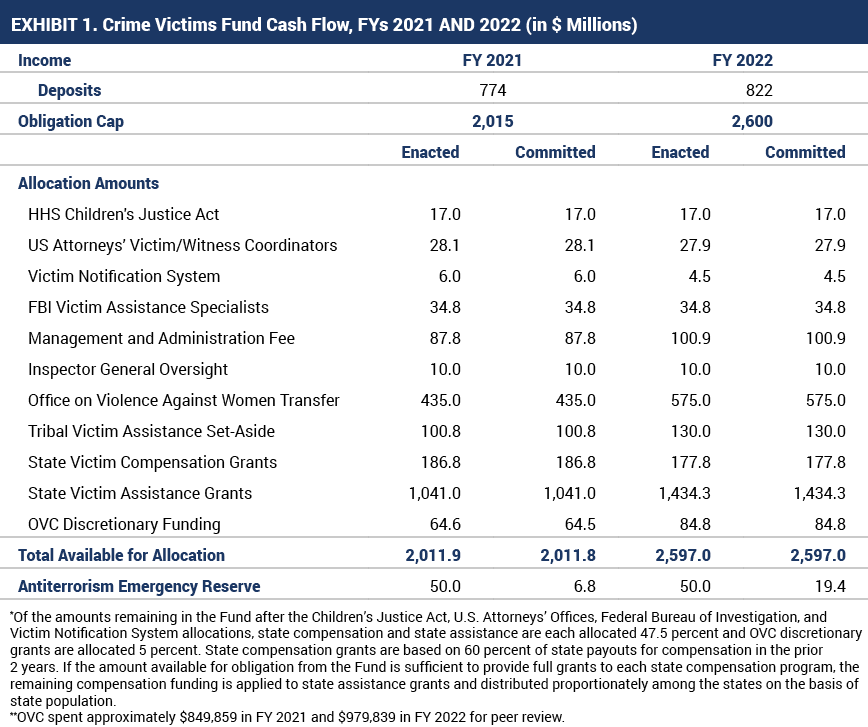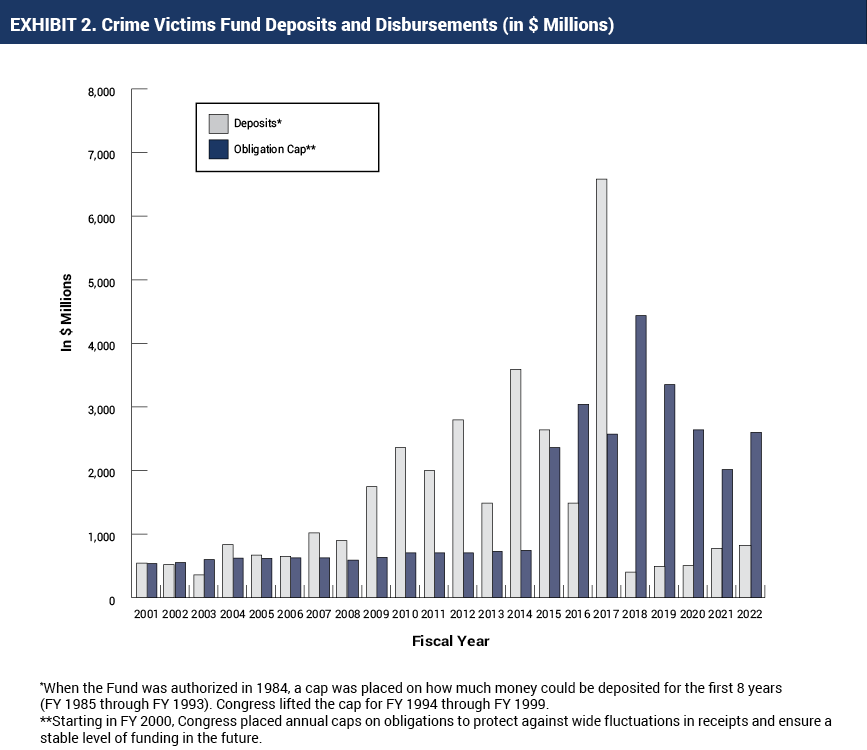Archival Notice
This is an archive page that is no longer being updated. It may contain outdated information and links may no longer function as originally intended.
Crime Victims Fund
The Crime Victims Fund (CVF), established by the Victims of Crime Act of 1984, supports services for victims of crime throughout the Nation. OVC is charged by Congress with administering the CVF, which is composed primarily of fines, penalties, special assessments, and bond forfeitures from persons convicted in federal cases, not tax dollars. The CVF supports thousands of programs annually with millions of dollars invested in services provided directly to crime victims who have suffered physical, emotional, and financial harm from victimization. See exhibit 1 for a breakdown of funding.
Main Sources of Revenue
Deposits into the CVF consist of—
- criminal fines from offenders convicted of federal crimes, with exceptions for funds related to certain environmental, railroad, unemployment insurance, and postal service violations.
- monetary penalties from federal deferred prosecution and non-prosecution agreements. (Prior to the signing of the VOCA Fix to Sustain the Crime Victims Fund Act of 2021, these funds were deposited into the Treasury.)
- forfeited appearance bonds from convicted federal offenders.
- special forfeitures of collateral profits from crime.
- special assessments for individuals and corporations convicted of federal crimes.
- gifts, donations, and bequests by private parties.
Appropriation Cap
Beginning in 2000, in response to large fluctuations in deposits, Congress placed an obligation limit on funds available for distribution. This limit, also known as the appropriation cap, was meant to ensure that the CVF remains a stable source of support for future services. Deposits have been steadily declining since 2018 and the cap has been lowered as a result. In FY 2021, the appropriation cap on the Fund was $2 billion, and in FY 2022, the appropriation cap was similarly set at $2.6 billion. The decrease in available funds since 2018 has been felt the most by organizations providing direct services to victims of crime, including domestic violence shelters, criminal justice and community-based victim advocacy programs, children’s advocacy centers, crisis hotlines, emergency housing, legal assistance for victims, and many other programs in communities. In FY 2022, these programs served more than 9 million victims of crime (new and returning individuals).
The VOCA Fix
In a historic effort to stabilize the CVF, President Biden signed the VOCA Fix to Sustain the Crime Victims Fund Act of 2021 (VOCA Fix) on July 22, 2021, which became effective immediately. The provisions of the Act—
- require monetary penalties from federal deferred prosecution and non-prosecution agreements to go into the CVF.
- provide the Attorney General with the authority to provide no-cost extensions to all VOCA award recipients.
- allow state VOCA administrators to waive, or require them to waive, subgrantee match requirements.
- increase the federal grant calculation for funding to victim compensation programs from 60 to 75 percent of state-funded payouts.
- instruct OVC not to deduct restitution payments and subrogation for payment under a civil lawsuit recovered by state victim compensation funds when calculating victim compensation awards.
- clarify that state programs may waive the requirement to promote victim cooperation with law enforcement for victims to receive compensation.
Following the passage of the VOCA Fix Act, OVC and the Department acted swiftly to implement the provisions.
- The Office of the Deputy Attorney General notified the Executive Office of United States Attorneys about the VOCA Fix with a focus on the provision that directed funds from federal deferred prosecution and non-prosecution agreements to go into the CVF.
- OVC approved all state and territory no-cost extension requests, as required by the VOCA Fix, preventing approximately $970 million dollars in VOCA formula funding from expiring on September 30, 2021. Since then, OVC approved additional no-cost extension requests for awards ending on September 30, 2022, preventing more than $660 million dollars from expiring.
- The Department also modified the debt collection tracking system to ensure that monies collected from deferred and non-prosecution agreements are deposited into the Fund, and provided training and guidance to ensure the VOCA Fix Act is implemented appropriately.
- OVC briefed Department components responsible for the largest contributions to the Fund on the importance of these resources and the support they provide crime victims.
As of September 30, 2022, approximately $756 million had been deposited into the CVF from non-prosecution agreement and deferred prosecutions – a direct result of the VOCA Fix and the Department’s efforts to increase deposits.
FYs 2021 and 2022 Fund Deposits
During FYs 2021 and 2022, the CVF received more than $1.5 billion to support victims of crime (see exhibit 2). This includes the amounts received through federal deferred prosecution and non-prosecution agreements—one of the provisions in the VOCA Fix Act. In 2021 and 2022, the amounts were $224.5 million and $531 million, respectively.
As of September 30, 2022, the CVF balance was $1.499 billion, the lowest in more than 15 years.
For more information about VOCA compensation and assistance, including the allocation process established by Congress, see the Crime Victims Fund. State-by-state allocations for VOCA compensation and assistance for 2021 and 2022 are available on the OVC website.






